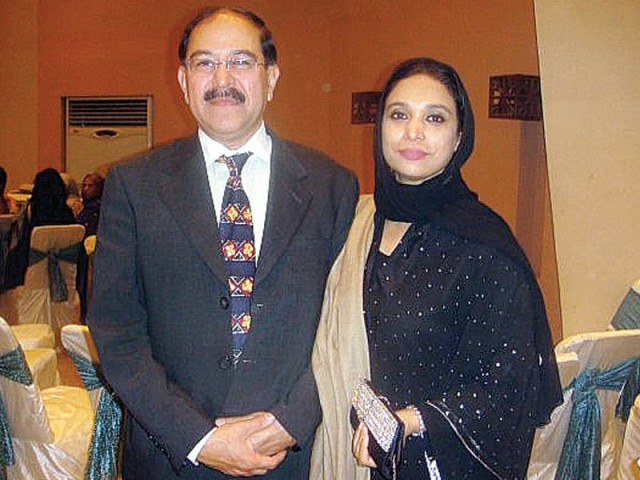Positive Pakistanis: As good as it gets
A philanthropic couple is determined to help in as many ways as they can.

“Work is accomplished by doing it, not by talking about it,” says Lubna, quoting from Tehmina Durrani’s biography of Abdul Sattar Edhi, A Mirror to the Blind. “When I read this book, I felt inspired to help society in some way.”
Lubna heads the Hope Uplift Foundation (HUF) which manages different charitable projects. Her upcoming ventures include motivational workshops to encourage people to donate to good causes.
Ten years ago, Lubna’s nine-year-old daughter Anum won a ‘young entrepreneur’ award and in an interview with a newspaper expressed a desire to become a social worker when she grew up. Soon afterwards, a car arrived at their house and dropped off an envelope containing Rs5,000. That became the seed money for what would become a very ambitious project.
“My husband and I raised some more money and opened the first medical dispensary in Lahore’s Model Colony, a poor neighbourhood on the outskirts of Defence,” says Lubna. An employee of Kasur Gulab Devi Hospital and an old friend of the couple, Dr Ijaz Rizwan, agreed to work in the clinic five days a week.
Next, Lubna opened two schools, one in Charrar Village in the middle of Defence, and another in Model Colony. Today, over 200 students are enrolled at the Model Colony school where they are given lunch free of cost. The HUF also provides funds to T1, a home for the destitute which currently accommodates around 15 widows.
Among HUF’s numerous projects is a travel home on the outskirts of the Shaukat Khanum Cancer Hospital, which lodges nearly 200 visitors who have no place to stay. Beds, tea and washroom facilities are provided free of cost, while free meals are given twice a month. Seven months ago, Lubna started giving small, interest-free loans to people in dire need of money under a micro-financing scheme. A student who earned a scholarship to a UK school was given Rs 50,000 as he had no money to rent accommodation. He returned the amount within four months. Similarly an embroiderer was granted a loan of Rs 100,000 to buy thread and begin a business. She returned the money in eight months.
Today the number of charity projects under the HUF stands at 27. These include programs that provide subsidised meals to the poor, dowries to women about to get married, and educational scholarships to needy students. Under the Natural Disaster Program initiated by HUF last year, 102 flood-affected homes were constructed in Layyah. HUF is also contributing towards a community centre with some help from the government in Layyah, that will include two schools, a mosque and a vocational centre for women. Rs40,000 to Rs50,000 is donated to Al Shifa Eye Hospital every month for transplants and cataract removal operations.
HUF raises money by getting 57 women under Friends of Lahore for HUF donate Rs1,000 every month for a year. The money has been used to give donations to Al-Shifa Eye Trust, pay the schools fees for orphans at SOS, rehabilitate drug addicts, give bicycles to deserving families, build concrete rooftops and floors in a slum area, and treat burn and kidney patients.
Around Rs8,000 come from the Hope Uplift welfare shop in Punjab Society, which sells used clothes, furniture and electronics donated by Lubna’s friends and acquaintances. Women belonging to poorer areas, make and sell chutneys and pickles through a herbal shop, established by Lubna. Half the profit goes to these women while the other half is contributed to HUF projects.
HUF inspires other people to donate money to its cause too. Two jewelers give 10 per cent of their earnings while a milkman give five per cent of his. The Punjab radiology centre also donates a certain amount to HUF.
Lubna isn’t the only do-gooder in the family. Her husband, Salman Shakoh set up a dialysis centre at Ganga Ram Hospital ten years ago with Rs1.5 million that he raised with the help of friends. Shakoh recruited and trained staff for the dialysis centre, though he wasn’t an employee of the hospital. Then, five years later, he set up another dialysis centre at the Mayo Hospital. Out of the 250,000 Pakistanis in need of dialysis, only 15,000 undergo treatment because of poverty and lack of facilities.
Though public hospitals have started providing dialysis for free as long as the cost of the dialysis kit (Rs1,500) is borne by the patient, the number of patients in need of dialysis still outnumber the facilities available. Donations for Shakoh’s dialysis centre at Ganga Ram Hospital were around Rs300,000 but dropped to Rs90,000 a month after the Punjab government made the dialysis treatment free.
Shakoh sometimes worries about his wife, given that she juggles so many responsibilities at once. But both husband and wife live by the belief that goodness comes to one by doing good to another.
Published in The Express Tribune, Sunday Magazine, March 27th, 2011.



















COMMENTS
Comments are moderated and generally will be posted if they are on-topic and not abusive.
For more information, please see our Comments FAQ